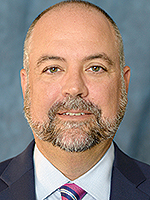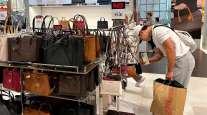Senior Reporter
Economist Noel Perry Sees US Recession Looming in Late 2020

[Stay on top of transportation news: Get TTNews in your inbox.]
Transportation economist Noel Perry with the firm Transport Futures is a lot like the famous character in the vintage television commercial from the 1970s for the financial services company EF Hutton. At the critical moment in the spot, everyone gets quiet when the announcer solemnly proclaims, “When EF Hutton talks, people listen.”
In the trucking, freight and logistics industry, when Perry talks, people listen.
In an interview on Transport Topics Radio on SiriusXM Channel 146 that will air Nov. 23 at 1 pm Eastern time, Perry said the state of the U.S. trucking economy has been decent in 2019, though not at the record-setting level of 2017-18.

Perry
But he sees trouble in 2020.
“The slowdown we have already seen, which is a fact in both manufacturing and trucking in 2019, is typical of the year before a recession. So, yes, I am specifically forecasting a recession beginning in the third quarter of 2020,” Perry said. “There are two things that are occurring that are classic precursors to a recession. The global economy is slow and that has affected our exports, and it’s knocked out as much as the trade problems we have had. That’s the first half.
“The second half is that the business cycle that causes recessions and recoveries is tired. People who manufacture things, who invest in things, they’re slowing down.”
As evidence of Perry’s theory about the importance of exported goods, exports at the nation’s busiest port, the Port of Los Angeles, fell in October by 19.2%. The ports of Los Angeles and nearby Long Beach are the busiest facilities in the country when it comes to trade with Asian nations, and China leads the list.
Perry says the trade dispute is just one symptom of a slowing economy.
“I don’t think the trade problems are big enough to fundamentally change the result. They are definitely a negative, and they may be a positive long term if we can get some concessions from China. But in the short term, they’re a negative,” he said. “I don’t think they’re a grueling negative. I think they’re just another contributor to a bunch of things, other things that are more powerful that are taking us down.”
With the U.S. economy showing a gross domestic product of 1.9% in the third quarter, and unemployment at its lowest level in 50 years, Perry says he’s not surprised many economists believe the more than 10-year-long recovery can continue.
“The overall economy is not in a recession yet. Manufacturing is. But retail and the consumption activity that makes up 80% of the economy is doing OK. It’s very normal now for late recovery times,” he said. “After 10 years, people are hiring and people are giving raises, they feel good about their businesses, and so they hire a few more people and they give a bit more in the way of raises.
“Consumption activity to include services usually peaks late in a recovery and that’s where we are now. The retail sector has not joined the manufacturing sector and the transportation sector in slipping. I still expect that to happen.”
At the American Trucking Associations annual economic conference in September, ATA Chief Economist Bob Costello said contract rates remain strong, albeit not at 2017-18 levels, but the spot market rates continued to be very soft. Perry expects a slight upturn in late November for the spot market.

Costello
“The only thing that happens now in the fall is there is a little bump in spot rates, because the retailers get behind on some critical products, and they got to have it for Cyber Monday and they got to have it for the day after Thanksgiving and they will pay a premium for it,” he said.
Perry said now is the time for trucking industry officials to prepare for a downturn. He’s optimistic it won’t be a long or deep recession.
“Once the economy starts going up, and we have not had a recession that lasted more than two years since the Depression, and then, once it goes up, you can make hay,” Perry said. “Everyone else is in the bunker thinking about how they can survive, and they’re not thinking about expanding and growing. Rather than competing with everyone else, you’re only competing with a few people. Everyone else is trying to get back to where they were. Great opportunities.”
Want more news? Listen to today's daily briefing:




